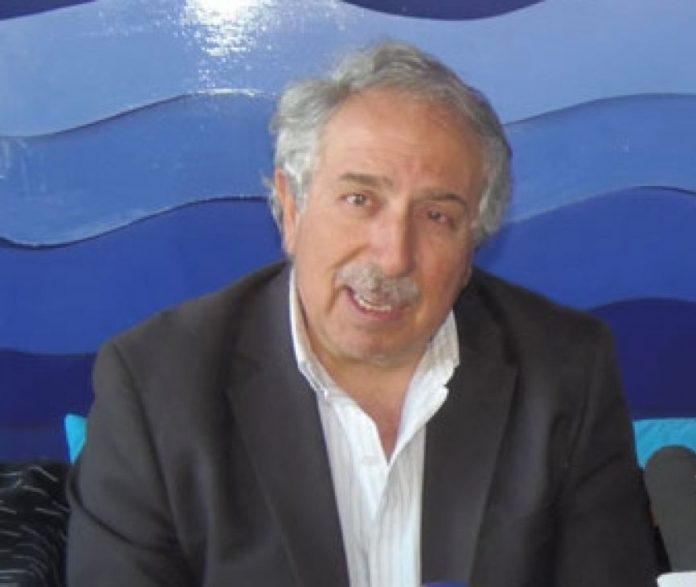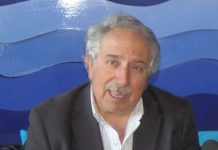Σχόλιο για την φετινή παγκόσμια μέρα νερού
Αντίλογος στην ωραιοποιημένη κατάσταση στην Κω.
- Διαβάσαμε την ανακοίνωση του προέδρου της ΔΕΥΑΚ με αφορμή την χθεσινή παγκόσμια μέρα νερού. Ο σχολιασμός της γίνεται για ένα και μόνο λόγο. Είναι ένας νέος άνθρωπος (σε μια πολύ απαιτητική θέση) που θα έπρεπε να μιλήσει αυτή την επετειακή ημέρα εντελώς διαφορετικά από ότι οι προκάτοχοι του. Οι δηλώσεις του για το σημαντικό πρόβλημα του νησιού μας, για το πόσιμο νερό, είναι ίδιες, περίπου, με των περασμένων χρόνων. Αποπνέουν την τυπικότητα που επικρατεί στην τοπική πολιτική: το χάος των προηγουμένων και η νέα κατάσταση με πολλά και μεγάλα έργα! Απαριθμεί σπουδαίες παρεμβάσεις που έγιναν ήδη και γίνονται , αποφεύγοντας να μιλήσει με το χέρι στην φωτιά για τα προβλήματα διαχείρισης που υπάρχουν.
- Η φετινή Παγκόσμια Ημέρα Νερού είναι η πρώτη μετά την δημοσίευση της αναθεωρημένης από την Ευρωπαϊκή Ένωση Οδηγίας για το Πόσιμο νερό (αναθεώρηση της οδηγίας 98/83/ΕΚ για το πόσιμο νερό1998, TheDringingWaterDirective 98/83/ΕC της 16 Δεκεμβρίου 2020), η οποία θέτει όρια για την ασφάλεια της υγείας (για παράδειγμα ορίζει την περιεκτικότητα σε μικροβιολογικούς ρύπους, μόλυβδο, σίδηρο κλπ.) και αναφέρει:
—Πρέπει να τηρούνται βασικά πρότυπα ποιότητας για το νερό που προορίζεται για ανθρώπινη κατανάλωση, που ορίζει η Οδηγία.
—Απαιτεί από τα κράτη μέλη να παρακολουθούν τακτικά την ποιότητά του με τη χρήση της μεθόδου των «σημείων δειγματοληψίας»
—Τα κράτη μέλη μπορούν να θεσπίσουν μόνο αυστηρότερα πρότυπα.
—Η οδηγία απαιτεί επίσης την τακτική ενημέρωση των καταναλωτών.
—ανά 3-ετία πρέπει να υποβάλλεται έκθεση στην Επιτροπή σχετικά με την ποιότητα του πόσιμου νερού
- Σε σχέση με τα προηγούμενα θα ρωτήσουμε:
α. η ΔΕΥΑΚ τηρεί τα πρότυπα ποιότητας του πόσιμου νερού που επιβάλλει η Οδηγία της 98/83 της Ε.Ε. και τι αλλαγές θα κάνει η ΔΕΥΑΚ για την εναρμόνιση μας με την αναθεωρημένη οδηγία; β. Ενημερώνονται οι καταναλωτές δηλαδή όλοι εμείς για τις μετρήσεις της ποιότητας του νερού; γ. Η απαίτηση ενημέρωσης των καταναλωτών που επιβάλλει η οδηγία γίνεται-θα γίνει στους Αντιμαχίτες, Κεφαλιανούς και Καρδαμιώτες ώστε να γνωρίζουν αν το νερό που τους παρέχει η ΔΕΥΑΚ είναι εντός των πλαισίων της οδηγίας; Γιατί δεν έχει ανακληθεί η παλιά γνωμάτευση της ΔΕΥAΚ ότι το νερό στον Δημοτικό Διαμέρισμα Ηρακλειδών είναι μη πόσιμο;
- Πόσο πιο ενδιαφέρον θα ήταν ο κ. Ζαχαρός με την άνεση που το δίνει (όχι η ηλικιακή του νεανικότητα άλλα…) η πολιτική του νεότητα να απαντούσε σε κάποιες από τις πληγές της διαχειριστικής πρακτικής των προηγούμενων αρχών και να έθετε στόχους που η λογική επιβάλλει για το νησί μας και η DringingWaterDirective 98/83/ΕC της 16 Δεκεμβρίου 2020 θεσπίζει! … του χρόνου!
Ν. Μυλωνάς
(ακολουθεί περίληψη της Dringing Water Directive 98/83/ΕC της 16 Δεκεμβρίου 2020)
THE REVISED DRINKING WATER DIRECTIVE
On 16 December 2020, the European Parliament formally adopted the revised Drinking Water Directive. The Directive will enter in force on 12 January 2021, and Member States will have two years to transpose it into national legislation.
The Drinking Water Directive 98/83/EC overview
The Drinking Water Directive (Council Directive 98/83/EC of 3 November 1998 on the quality of water intended for human consumption) concerns the quality of water intended for human consumption. Its objective is to protect human health from adverse effects of any contamination of water intended for human consumption by ensuring that it is wholesome and clean.
The consolidated text of the Directive with its latest amendments including Commission Directive (EU) 2015/1787 of 6 October 2015 can be found in the Directory of European Union consolidated legislation.
The Drinking Water Directive applies to:
- all distribution systems serving more than 50 people or supplying more than 10 cubic meter per day, but also distribution systems serving less than 50 people/supplying less than 10 cubic meter per day if the water is supplied as part of an economic activity;
- drinking water from tankers;
- drinking water in bottles or containers;
- water used in the food-processing industry, unless the competent national authorities are satisfied that the quality of the water cannot affect the wholesomeness of the foodstuff in its finished form.
The Drinking Water Directive doesn’t apply to:
- natural mineral waters recognised as such by the competent national authorities, in accordance with Council Directive 80/777/EECof 15 July 1980 on the approximation of the laws of the Member States relating to the exploitation and marketing of natural mineral waters and repealed by Directive 2009/54/EC of 18 June 2009 on the exploitation and marketing of natural mineral waters; and
- waters which are medicinal productswithin the meaning of Council Directive 65/65/EEC of 26 January 1965 on the approximation of provisions laid down by law, regulation or administrative action relating to medicinal products and repealed by Directive 2001/83/EC of 6 November 201 on the Community code relating to medicinal products for human use.
The Directive laid down the essential quality standards at EU level. A total of 48 microbiological, chemical and indicator parameters must be monitored and tested regularly. In general, World Health Organization’s guidelines for drinking water and the opinion of the Commission’s Scientific Advisory Committee are used as the scientific basis for the quality standards in the drinking water.
When translating the Drinking Water Directive into their own national legislation, Member States of the European Union can include additional requirements e.g. regulate additional substances that are relevant within their territory or set higher standards. Member States are not allowed, nevertheless, to set lower standards as the level of protection of human health should be the same within the whole European Union.
Member States may, for a limited time depart from chemical quality standards specified in the Directive (Annex I). This process is called «derogation«. Derogations can be granted, provided it does not constitute a potential danger to human health and provided that the supply of water intended for human consumption in the area concerned cannot be maintained by any other reasonable means.
The Directive also requires providing regular information to consumers. In addition, drinking water quality has to be reported to the European Commission every three years. The scope of reporting is set out in the Directive. The Commission assesses the results of water quality monitoring against the standards in the Drinking Water Directive and after each reporting cycle produces a synthesis report, which summarizes the quality of drinking water and its improvement at a European level.
Further principles laid in the Directive are:
- Planning
- Regulation(obligations of the Member States and the Commission)
- Monitoring
- Information and Reporting
In accordance with the provisions of Article 14 of the Directive, the deadlinewas November 2003 for the 15 Member States which were part of the EU before 2004 (EU-15) to have taken the measures necessary to ensure that the quality of water intended for human consumption complies with the Directive. New Member States had to comply with the Directive by the day of accession unless specific implementation deadlines were laid down in the Accession Treaties.

















file:///home/user/%CE%95%CF%80%CE%B9%CF%86%CE%AC%CE%BD%CE%B5%CE%B9%CE%B1%20%CE%B5%CF%81%CE%B3%CE%B1%CF%83%CE%AF%CE%B1%CF%82/%CE%A3%CF%84%CE%B9%CE%B3%CE%BC%CE%B9%CF%8C%CF%84%CF%85%CF%80%CE%BF%20%CE%B1%CF%80%CF%8C%202021-03-19%2019-13-19.png
δουλικότητα στους πελάτες, γλίτωναν λίγα βήματα για το καθημερινό μπάνιο,
κατακαπατήσαμε λίγο δημόσιο χώρο με προπτική να το μεγαλώσουμε ως ιδιωτικό και βλέποντας και κάνοντας
Αξιοθαύμαστη επέβαση επιχειρηματία, Κώου ξενοδόχου. υφίσταται επί δεκαετίες αφού οι φωνές για την της υπεράσπιη της φύσηςταμησαν στο Δήμο ή στις τοπικές υπηρεσίες Δασών και Γεωργίας. Στο αριστερό τμήμα το νερό πλέον είναι, μόνο δεξιά είναι «γλυκό».
Υποσημείωση: ο υγρότοπος στο Ψαλλίδι ειχε εμβαδόν κάτω από 90 στρέμματα. Η Αλυκή στο Τιγκάκι από 1500 ετρέμματα κατάντησε λιγότερα από 900 στρέμματα.